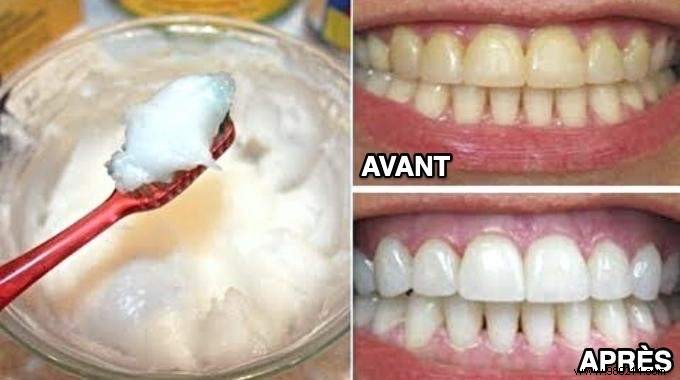
Did you know that coconut oil has powerful health benefits? dental health?
Not only does it have many virtues for hair and skin...
...but it has also been used for centuries to make mouthwashes.
This whitening practice eliminates bad breath and bacteria.
But that's not all!
Coconut oil mouthwashes have the power to whiten teeth naturally.
Here are 4 amazing benefits of coconut oil for teeth that no one knows about . Watch:
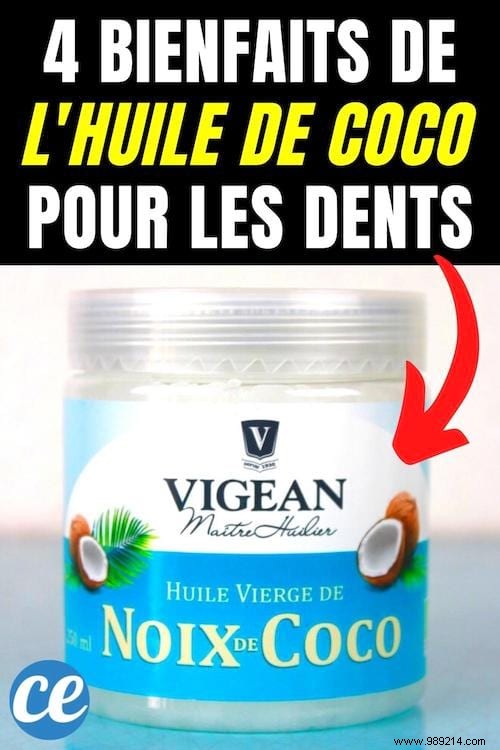
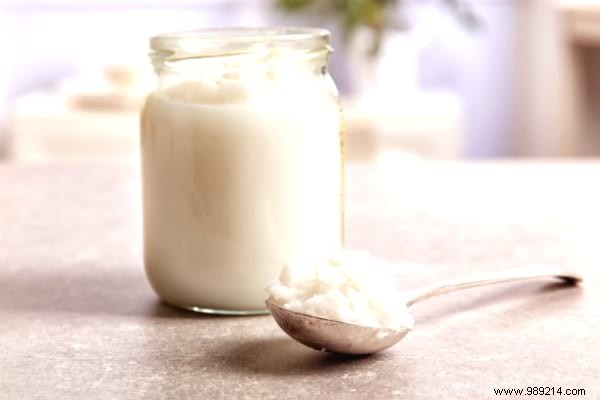
We can't talk about the benefits of coconut oil for teeth without talking about mouthwashes.
In Ayurvedic medicine, coconut oil mouthwashes have been used for centuries.
This practice is called "oil pulling ", the English term that specifically refers to mouthwashes with coconut oil.
Why the term oil pulling (literally, "draw oil")?
Because it involves "pulling" the oil to get it between the teeth.
More simply, it involves melting the oil in your mouth and "swirling" it over and around the teeth.
Exactly like you would with any other mouthwash, in fact.
So this is the method to use to eliminate bad bacteria from your mouth.
Coconut oil mouthwashes help fight cavities and eliminate bad breath. (Source 4)
As you will see, studies prove that mouthwashes are good for healthy teeth.
But also the health of the gums and the mouth in general.
And that's not all...
Doing mouthwashes with coconut oil prevents the development of dental plaque. (Source 5)
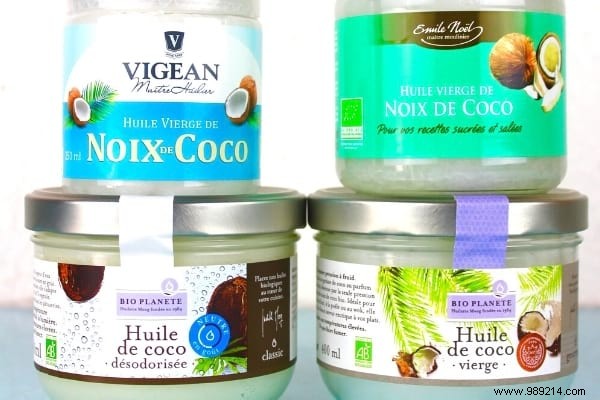
Coconut oil eliminates bacteria responsible for bad breath, cavities and gum disease. (Source 4, Source 6)
It is particularly effective against Streptococcus mutans (S.mutans ).
Does this scientific name mean anything to you?
Well, know that this bacteria in the mouth is one of the main causes of dental caries.
Coconut oil also helps eliminate Candida albicans , one of the most common pathogenic bacteria. (Source 5, Source 7)
The antibacterial action of coconut oil is scientifically proven.
Researchers have found that coconut oil mouthwashes significantly reduce the presence of S. mutans .
In this study, participants rinsed with 10 ml of coconut oil daily.
This is about 2 teaspoons of coconut oil :1 in the morning and 1 in the evening.
And this, for only 2 weeks!
By the way, have you ever heard of chlorhexidine?
It is one of the most common antibacterial ingredients in commercial mouthwashes.
Researchers have discovered a rather incredible trick.
It turns out that the antibacterial action of coconut oil is comparable to that of chlorhexidine. (Source 8)
Another study also demonstrated a significant reduction in the bacterium S. mutans thanks to coconut oil.
Except that this time, it was children who made mouthwashes.
And only for 2 to 3 min a day, over a period of 30 days.
Once again, the results were favorable!
Researchers have proven that coconut oil and chlorhexidine have the same effectiveness. (Source 9)
So why use a chemical mouthwash when you can use coconut oil?
No interest ! You can easily replace it with this 100% natural product.
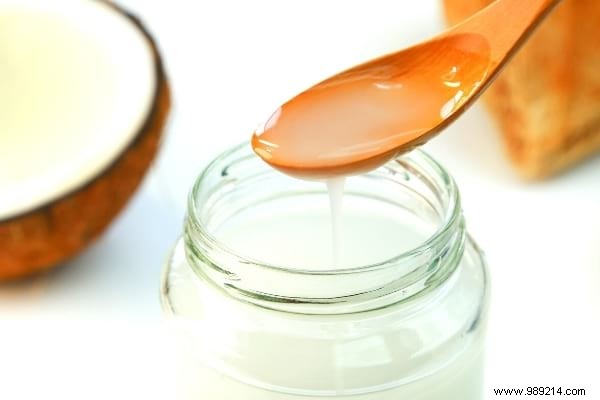
Also called gum disease, gingivitis is an inflammation of the gums.
It is manifested by bleeding and tenderness of the gums.
The cause of gingivitis?
Be aware that it is mainly due to the accumulation of bacteria and dental plaque on the teeth.
Dental plaque is also favored by insufficient oral hygiene. (Source 11)
Hence the interest of making mouthwashes with coconut oil!
Scientific studies prove that coconut oil attacks the problem of gingivitis at its source.
It reduces the accumulation of dental plaque on the teeth.
And therefore, it also helps to reduce gum inflammation and fight gingivitis.
In one study, participants rinsed with coconut oil for 30 days.
All suffered from gum disease due to plaque buildup.
The result?
Researchers have proven that coconut oil reduces dental plaque deposits and the symptoms of gingivitis. (Source 12)
After 30 days, participants' average plaque levels decreased by 68%. And that of gingivitis by 56%.
And it doesn't stop there!
Another study also revealed a significant reduction in the index of dental plaque and bleeding gums.
The participants rinsed with coconut oil for 20 minutes a day for 30 days. (Source 13)
Finally, a last study also gave identical results.
This time, the participants rinsed 10 minutes a day for 7 days only. (Source 14)
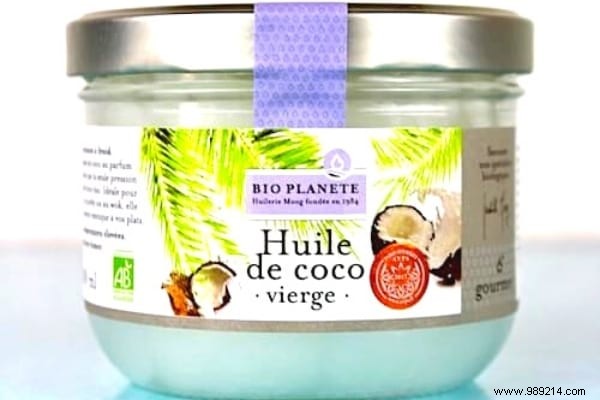
Halitosis is one of the most common oral hygiene problems.
For those unfamiliar with the term, halitosis is more commonly known as bad breath,
Certain medications and medical conditions can make bad breath worse.
But in 85% of cases , bad breath is caused by:
- or insufficient hygiene,
- or a dental problem. (Source 15)
What kind of dental problems?
There are many causes that can lead to unpleasant and smelly breath.
The most common are gingivitis, tooth decay, food residue and bacteria buildup on the tongue. (Source 15)
Do you also fight against bad breath?
This nuisance is very common:it affects 25 to 50% of the world's population!
Fortunately, you should know that mouthwashes with coconut oil are a very effective remedy for bad breath.
Again, this is thanks to the famous antibacterial properties of coconut oil.
It is this action that makes it so effective in eliminating bad odor-causing bacteria from the mouth.
And it doesn't stop there...
Coconut oil also destroys food residue on the teeth, inside the cheeks and on the tongue. (Source 16)
The anti-bad breath action of mouthwashes with coconut oil is scientifically proven.
Researchers found a significant reduction in bad breath index after rinsing.
But maybe you don't have coconut oil handy?
Know that sesame oil has the same cleansing and antibacterial properties. (Source 17, Source 18)
And to fight bad breath, you can also use these 12 natural foods.
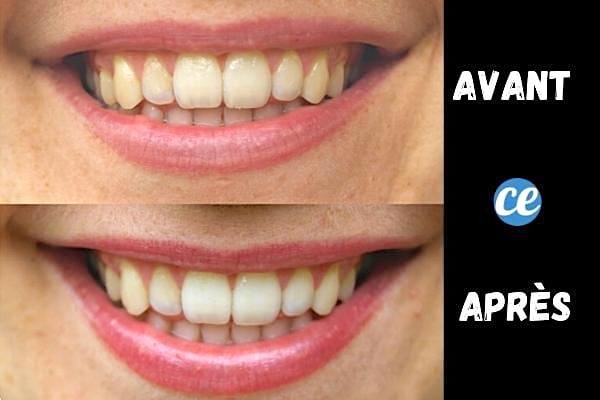
And yes, coconut oil is also known to whiten teeth.
Indeed, as mentioned previously, we already know that it is effective for:
- reduce dental plaque,
- prevent the appearance of gingivitis and
- eliminate bad breath.
Its effectiveness comes mainly from its action on bacteria that accumulate on the teeth and in the mouth.
These bacteria are surrounded by a fatty membrane, and are attracted to dental plaque.
Therefore, by attacking bacteria, coconut oil also loosens plaque from your teeth.
And it is precisely there that it also becomes effective in whitening teeth.
Simply put, by removing plaque, it makes your teeth whiter.
Scientifically speaking, there are few studies proving that coconut oil helps whiten teeth. (Source 19)
But at the same time, no study to date has proven that it has any negative effect on your teeth!
So it's all the more interesting to try it for yourself, don't you think?
In any case, experts in Ayurvedic medicine are formal:coconut oil is effective for whiten teeth.
But they point out that several factors can reduce its effectiveness, including:
- drink coffee in large quantities and
- drinking wine (even in small quantities, it is known to stain the teeth).
To whiten your teeth, all you need is 1 teaspoon of coconut oil.
Put it in your mouth and let it melt on your tongue.
Then swish it around in your mouth for 5-20 minutes.
Don't worry, we explain in detail how to make a mouthwash, in the point below.
The trick to remember is to swirl the oil all over your mouth…
Especially on gums and teeth .
If you wish, you can whiten your teeth with coconut oil every day.
But followers of this method recommend doing it 3 to 4 times a week instead. That is approximately every 2 days .
Maybe swirling coconut oil in your mouth isn't really your thing?
So know that there is an alternative and just as effective method.
Just put some coconut oil on your toothbrush .
Then, brush your teeth as usual!
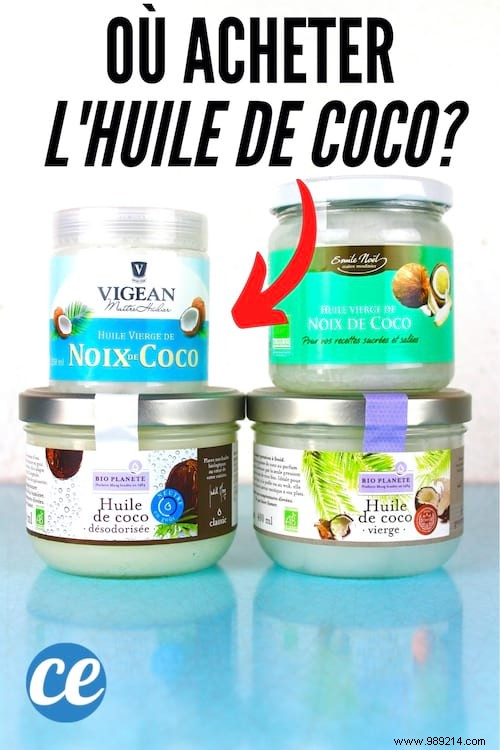
Thanks to its many natural benefits and uses, coconut oil has quickly become a trending product.
More and more people are also using it as a mouthwash.
And yet, it is far from being a new concept!
As mentioned earlier, this practice dates back to thousands of years ago, in India.
But then, what exactly does it consist of?
Don't worry, it's not very complicated.
Just swirl some coconut oil in your mouth for 15 minutes, then spit it out.
Essentially, you do just like any other mouthwash… except you use coconut oil! Watch:
1. Melt 1 tablespoon of coconut oil in your mouth.
2. Roll it around in your mouth for 5-15 minutes, pushing and pulling it between your teeth.
3. Spit the oil into a tissue.
Note: Avoid the sink, as coconut oil can clog pipes as it solidifies.
4. Rinse your mouth with clear water and brush your teeth.
If coconut oil is so effective, it is also because it has the ability to pass perfectly between the teeth.
Test for yourself and you will see...
Coconut oil manages to penetrate perfectly into all the interstices.
Especially the places where your toothbrush has trouble getting in!
These back and forth movements made by the mouthwash literally dissolve all the bacteria .
This is because the fatty acids in coconut oil remove and trap bacteria in the mouth.
Thus, with each mouthwash, you eliminate bad bacteria and reduce dental plaque.
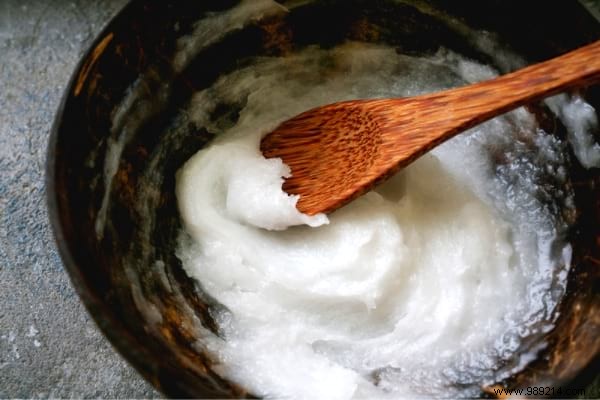
- Is your coconut oil still solid? Know that your body heat naturally melts it in seconds .
- Do your mouthwashes with coconut oil in the morning on an empty stomach . This is the best time, before eating or drinking anything.
- For best results, experts recommend rinsing once a day.
- Do not spit coconut oil in your sink ! As it cools, it will freeze and risk creating a clog.
- As you will have understood, making a mouthwash with coconut oil takes a little time...
So, I advise you to do like me:take the opportunity to do something else!
For example, while you are doing your mouthwash, take a shower or get ready for work .
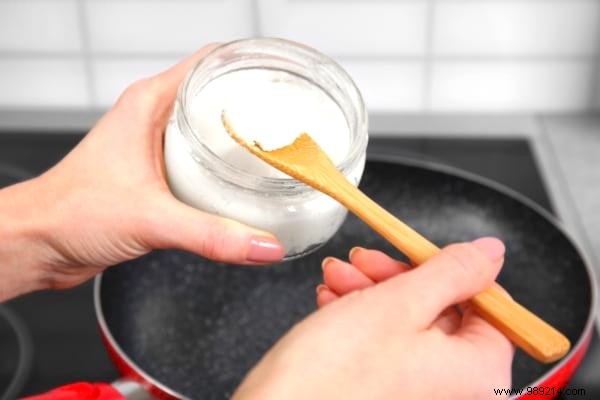
As the name suggests, coconut oil comes from the flesh of the coconut.
And the first thing to know is that it is perfectly edible and can be used in the kitchen!
In fact, it replaces any other vegetable oil in your recipes.
Moreover, it is one of the best natural sources in the world of saturated fatty acids. (Source 1)
Coconut oil is particularly rich in lauric acid , which alone accounts for half of coconut oil.
Coconut oil contains other fatty acids, such as palmitic acid and myristic acid, but in smaller amounts. (Source 1)
Lauric, palmitic, myristic acids… why tell you about all these saturated fatty acids?
It turns out that the fatty acids in coconut oil have powerful antibacterial properties.
Eh yes ! It is thanks to its fatty acids that coconut oil is so good for the health of the teeth.
Moreover, several scientific studies have proven the antibacterial properties of lauric acid. (Source1, Source2, Source3)
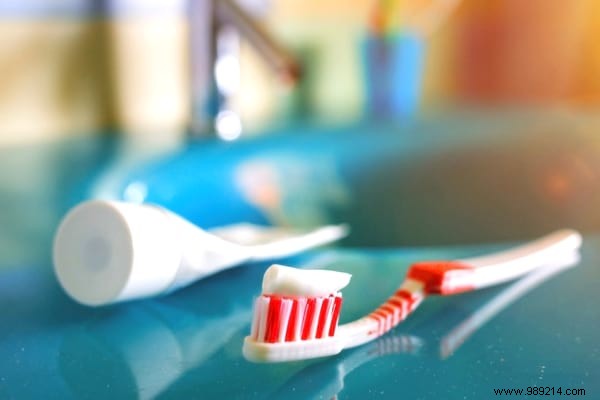
Coconut oil mouthwashes have many benefits for dental health.
But that doesn't mean they should replace your other mouth and teeth hygiene care.
As a reminder, here are some tips for having healthy teeth and good oral hygiene:
- Brush your teeth twice a day .
- Brush for 2 minutes . To help you, you can use an hourglass for brushing your teeth, like this one.
- Clean the spaces between the teeth with dental floss.
- Don't forget to brush your tongue and the inside of the cheeks. Use your toothbrush or a soft tongue scraper, like this one.
- Also remember to drink water throughout the day.
- Limit drinks and sugary foods .
- Avoid tobacco.
- Eat healthy foods.
- Consult your dentist at least once a year .

Don't worry, you can easily find coconut oil at the supermarket or in an organic store.
You can even buy it on the Internet, and for cheap!
On the other hand, experts advise to use only extra virgin coconut oil .
Why ? First, because it tastes better in the mouth.
But above all because virgin coconut oil is the least processed.
Which means it retains all of its natural benefits.